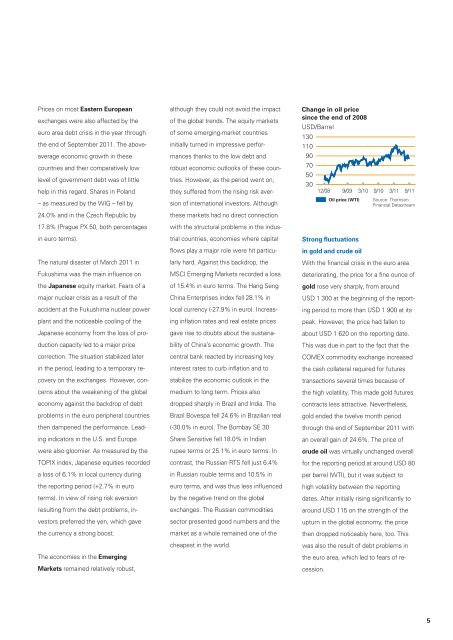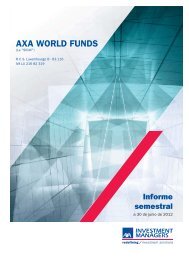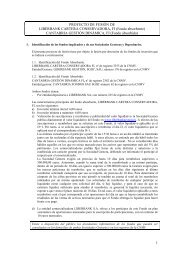DWS Deutschland - Cajastur
DWS Deutschland - Cajastur
DWS Deutschland - Cajastur
You also want an ePaper? Increase the reach of your titles
YUMPU automatically turns print PDFs into web optimized ePapers that Google loves.
Prices on most Eastern Europeanexchanges were also affected by theeuro area debt crisis in the year throughthe end of September 2011. The aboveaverageeconomic growth in thesecountries and their comparatively lowlevel of government debt was of littlehelp in this regard. Shares in Poland– as measured by the WIG – fell by24.0% and in the Czech Republic by17.8% (Prague PX 50, both percentagesin euro terms).The natural disaster of March 2011 inFukushima was the main influence onthe Japanese equity market. Fears of amajor nuclear crisis as a result of theaccident at the Fukushima nuclear powerplant and the noticeable cooling of theJapanese economy from the loss of productioncapacity led to a major pricecorrection. The situation stabilized laterin the period, leading to a temporary re -covery on the exchanges. However, concernsabout the weakening of the globaleconomy against the backdrop of debtproblems in the euro peripheral countriesthen dampened the performance. Leadingindicators in the U.S. and Europewere also gloomier. As measured by theTOPIX index, Japanese equities recordeda loss of 6.1% in local currency duringthe reporting period (+2.7% in euroterms). In view of rising risk aversionresulting from the debt problems, investorspreferred the yen, which gavethe currency a strong boost.The economies in the EmergingMarkets remained relatively robust,although they could not avoid the impactof the global trends. The equity marketsof some emerging-market countriesinitially turned in impressive performancesthanks to the low debt androbust economic outlooks of these countries.However, as the period went on,they suffered from the rising risk aversionof international investors. Althoughthese markets had no direct connectionwith the structural problems in the industrialcountries, economies where capitalflows play a major role were hit particularlyhard. Against this backdrop, theMSCI Emerging Markets recorded a lossof 15.4% in euro terms. The Hang SengChina Enterprises index fell 28.1% inlocal currency (-27.9% in euro). Increasinginflation rates and real estate pricesgave rise to doubts about the sustaina -bility of China’s economic growth. Thecentral bank reacted by increasing keyinterest rates to curb inflation and tostabilize the economic outlook in themedium to long term. Prices alsodropped sharply in Brazil and India. TheBrazil Bovespa fell 24.6% in Brazilian real(-30.0% in euro). The Bombay SE 30Share Sensitive fell 18.0% in Indianrupee terms or 25.1% in euro terms. Incontrast, the Russian RTS fell just 6.4%in Russian rouble terms and 10.5% ineuro terms, and was thus less influencedby the negative trend on the globalexchanges. The Russian commoditiessector presented good numbers and themarket as a whole remained one of thecheapest in the world.Change in oil pricesince the end of 2008USD/Barrel1301109070503012/08 9/09 3/10 9/10 3/11 9/11Oil price (WTI)Source: ThomsonFinancial DatastreamStrong fluctuationsin gold and crude oilWith the financial crisis in the euro areadeteriorating, the price for a fine ounce ofgold rose very sharply, from aroundUSD 1 300 at the beginning of the reportingperiod to more than USD 1 900 at itspeak. However, the price had fallen toabout USD 1 620 on the reporting date.This was due in part to the fact that theCOMEX commodity exchange increasedthe cash collateral required for futurestransactions several times because ofthe high volatility. This made gold futurescontracts less attractive. Nevertheless,gold ended the twelve month periodthrough the end of September 2011 withan overall gain of 24.6%. The price ofcrude oil was virtually unchanged overallfor the reporting period at around USD 80per barrel (WTI), but it was subject tohigh volatility between the reportingdates. After initially rising significantly toaround USD 115 on the strength of theupturn in the global economy, the pricethen dropped noticeably here, too. Thiswas also the result of debt problems inthe euro area, which led to fears of recession.5
















